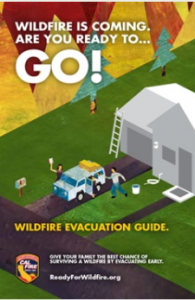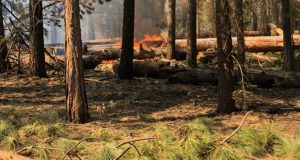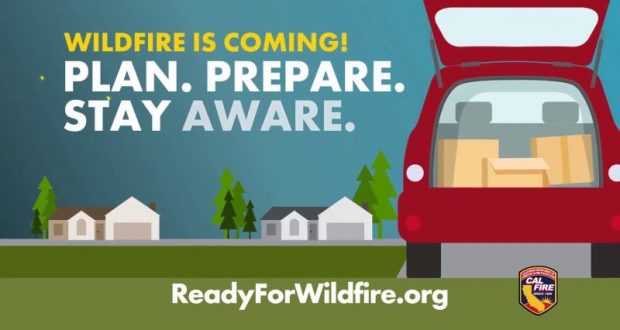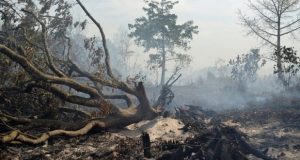OAKHURST – It’s not possible to predict when you’ll need to evacuate, but circumstances increasingly dictate that at the least you and your family must be prepared to leave at a moment’s notice. Each year our region has suffered serious wildfires, resulting in loss of property with potential for injury or loss of life. Already this year we’ve seen fires erupt with prospects for rapid spread. Don’t be caught in the “it’s only spring; too early for fires” thinking.
region has suffered serious wildfires, resulting in loss of property with potential for injury or loss of life. Already this year we’ve seen fires erupt with prospects for rapid spread. Don’t be caught in the “it’s only spring; too early for fires” thinking.
There’s much to be done to your home and property to prepare for wildfire season, but start “small,” with what you would need at the very least if forced to leave your land.
At minimum organize and pack a go-bag for you and each of your family members. Do it now. If you have no time for other preparation, you can ensure that you have sufficient supplies to survive away from home for three days at least. This scenario assumes you have only a few minutes to get yourself and your loved ones to safety once an evacuation order is issued.
 Katrina Poitras, Red Cross Disaster Coordinator for Madera and Mariposa Counties, suggests, “Look at at the preparations as if you’re going on a ‘camping trip’ with no access to amenities or belongings until the emergency is lifted. Pack what you know you can’t do without.”
Katrina Poitras, Red Cross Disaster Coordinator for Madera and Mariposa Counties, suggests, “Look at at the preparations as if you’re going on a ‘camping trip’ with no access to amenities or belongings until the emergency is lifted. Pack what you know you can’t do without.”
PERSONAL
- Clothing for each family member, enough to be away from home three days, if necessary, including underwear, shoes, socks, etc. Keep a full set of extra clothing for each family member close by in sleeping areas at night, in case of an immediate need to exit.
- Masks. Even though restrictions have lifted in many areas, they will likely be required at shelters or other public sites you may be directed to.
- Important documents, such as insurance information (health, home, auto), birth certificates, passports, copies of wills, trusts and advance directives. Consider placing copies of these documents on a flash drive to keep with you at all times. Even if you can’t grab your own computer or iPad, you can access public computers to view the data.
- Emergency phone numbers for family members, including, if possible, an out-of-state contact as a central point where all family evacuees can check in. Poitras says Long distance lines will not be impacted the way local cell towers and landlines are likely to be.
- Cash and/or credit cards. Keep a minimum amount of cash in your wallet or purse at all times for occasions when credit cards can’t be utilized.
- An evacuation plan, shared with family and/or friends, including where you plan to go in the event of evacuation. This, of course, can change depending on the nature and location of the emergency, but having a preliminary plan in place can save a lot of frustration. Rehearse the plan with family members, especially children, in case you get separated.
- Medications and prescriptions. Pack a three-day supply of current prescription medications to keep in your go-bag. Check with your physician and insurance plan about procedures to get prescriptions refilled if you are away from your normal facilities or if you must get them refilled in an emergency.
- First aid kit
- If you’re evacuating with children (or pets), bring materials to keep them entertained.
PETS
- Pet care items: leashes, food, food dishes, water dish, carrying crate, if necessary, pet records. If you make pet food from scratch, as I do, include some non-perishable food your pets can eat if you can’t grab their food from your fridge or freezer. Don’t forget to figure in drinking water for your animals. Crates or kennels can be essential to your pets’ comfort since they will be as stressed as you are, and a kennel provides a secure place for them.
VEHICLES
- A spare set of car keys and a full tank of gas for each car you’ll need. Maintain vehicle(s) in good working order, with functioning air conditioning and/or heating. Poitras cautions that evacuations often happen in the middle of the night.
ELECTRONICS
- Cell phone and charger plus extra fully-charged battery packs and the appropriate cables
- Battery-powered radio with extra batteries
FOOD
- Three days’ supply of non-perishable food (plus can opener if canned goods) and three gallons of water per person
If you can get them in time, grab the following.
- Laptop, iPad, computer, hard drive, with AC cord or charger for each
- Family photographs and/or heirlooms. If you have a safe place to take them, consider packing these up and moving them now. Retrieve them when fire season is over.
- Easily transportable jewelry and valuables.
Once you gathered your essential items, put them all in the same place, so you don’t waste time rummaging the house in various locations, thereby risking missing something vital.
Are you signed up for our local emergency alerts?
- Madera County, call 559/675-7770, or get the Everbridge app for Apple or Android
- Mariposa County, sign up at MSOalert.com.
The time to sign up is now, not when an emergency is in progress.
Listed here are valuable resources to refer to as you perform emergency preparations:
- Ready for Wildfire https://www.readyforwildfire.org/prepare-for-wildfire/go-evacuation-guide/pre-evacuation-preparation-steps/
- PG&E
- RedCross.org
In the time you took to read this article, you could have done most, if not all, of the essential preparedness steps.
What are you waiting for?
Take the PG & E preparedness quiz.
Join Madera County Supervisor Tom Wheeler for his monthly Town Hall Meeting on July 1. The topic will be Emergency Preparedness.





